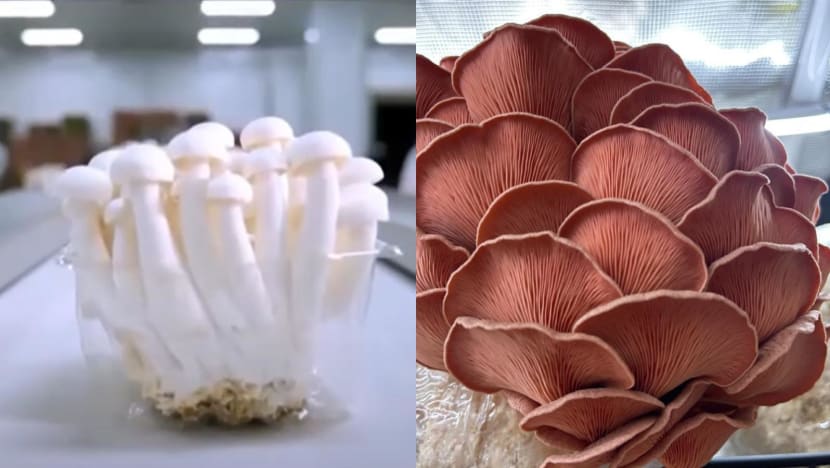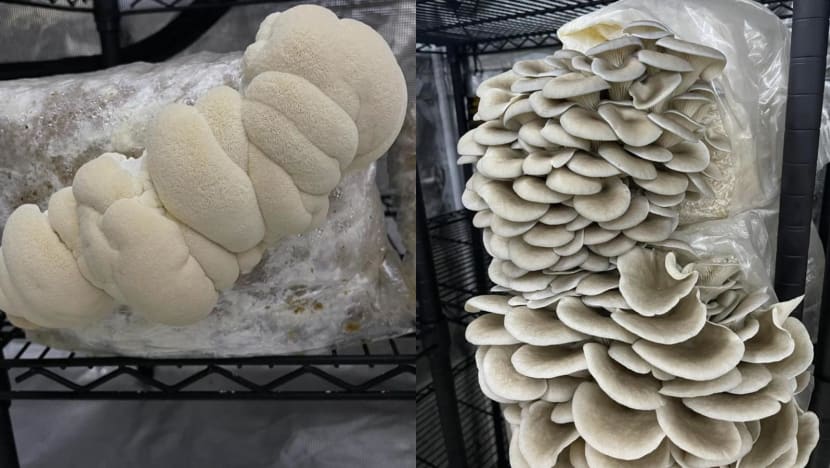Looking for cheaper mushrooms? You may soon get them from Singapore’s newest farm that taps AI

White button mushrooms grown in China by Finc Bio-Tech Mushroom (L), and pink oyster mushrooms grown in Singapore by Fogo Fungi.
SINGAPORE: Cheaper, better-quality produce at double the yield – this is what Singapore’s newest mushroom farm is looking to achieve with the help of automation and artificial intelligence.
The vertical farm expects to meet a third of local demand from consumers for white button mushrooms and is looking to price them at about S$7.50 per kg, or even lower. This is about half the current market price.
The farm, to be operated by Finc Bio-Tech Mushroom, is set to be built on a land parcel the size of three football fields at Sungei Tengah Close.
It hopes to start growing its first batch of mushrooms next year.
“The mushroom industry has been developed (on) a scale … that, for example, in China and Japan, at least 70 per cent of mushrooms are now grown in the factory. So that's why we want to duplicate our successful experience in other markets,” said Finc Bio-Tech Mushroom representative Bao Shengjie.
The Shanghai-based firm, which claims to be the world’s largest Shimeji mushroom manufacturer, has been growing mushrooms for decades. It also exports its produce to Singapore.
Finc runs four facilities in China that are powered by big data, AI and automation, producing nearly 260 tonnes of mushrooms – or the weight of 65 elephants – daily.
Now, it will bring similar technology to Singapore for the first time.
Dr Bao said that Finc will build the “most advanced automation system” for mushroom production in Singapore and leverage on AI to improve farming efficiency.
About 80 per cent of the Sungei Tengah Close farmland will be used to grow mushrooms, while the remaining 20 per cent will be for strawberries and tomatoes.
“For the white button mushrooms, the entire growing cycle, it's about 60 days,” noted Dr Bao.
“So we have a programme designed on each day of the mushroom development. On that specific day, we can predict what will be, for example, the length of the mushroom to be gained and what will be the weight of the mushroom that can be further developed on that specific day.”
This is how the farm expects to get a higher crop yield of about 2,500 tonnes of mushrooms yearly – more than 50 per cent compared with traditional farms – that can be sold at potentially lower prices.
Finc is also looking for more land to expand beyond growing white button mushrooms, including other types of crops like leafy vegetables.
It aims to contribute to 1 per cent of the government's “30 by 30” goal to produce 30 per cent of the nation’s nutritional needs locally by 2030.
MUSHROOMS CAN FULFIL SINGAPORE’S FOOD GOALS
Experts told CNA that the time is ripe to look at mushrooms as a serious option to meet Singapore’s food capability and capacity goals.
Professor William Chen from Nanyang Technological University’s School of Chemistry, Chemical Engineering and Biotechnology noted that while mushrooms are not vegetables but fungi, they contain fibre, have “all these nutrition profiles that fulfil our needs”, and are much easier to grow.
To boost mushroom farming in the country, Prof Chen said he thinks farmers should not just look at what retail customers broadly want. They should instead find out and meet demands for local produce from stakeholders like schools, restaurants or even hospitals.
“My sense is that we focus too much on the consumer part, (but) consumer is only one segment of the end-user and end-buyer,” he added.
Prof Chen, who is also director of the university’s food science and technology programme, was part of a team of researchers who cultivated a new type of alternative protein made from fungi and grown on food waste.
“The advantage of mushroom farming is that naturally they can generate different flavours,” he said.
MUSHROOMING SCENE
There are around seven mushroom farms in Singapore, with some of the newer local players only entering the scene a few years ago, according to the Singapore Food Agency.
Among them is Fogo Fungi, which was set up a year ago in a Tuas industrial estate. It specialises in premium gourmet mushrooms like golden oysters or lion’s mane, producing about 24 tonnes annually.
Its CEO Ryan Ong said it is also eyeing expansion as demand is up and it wants to sell to supermarkets soon. It mostly sells to hotels and restaurants at the moment for S$12 per 200g.
Mr Ong is now looking for a bigger plot of land in the next two years to scale up and bring costs down.
“In our farm, we utilise a controlled environment technology for the mushrooms. What we're trying to do is really to replicate mushrooms, the natural environment where they thrive (on) an indoor scale,” he told CNA.
“Compared to traditional mushroom farming, they can be up to 90 per cent more space efficient and resource efficient.”

Meanwhile, Finc has partnered local firms like agri-tech company Singrow to recycle its farm waste for other crops.
“We teamed up to build up the circular agricultural practice,” said Dr Bao, who is also Singrow’s founder and CEO.
“Singrow will come in to manage the strawberries and tomatoes production, and at the same time, we are working on other innovation projects for net-zero or even negative carbon production for such controlled environment agriculture,” he added.


No comments
Share your thoughts! Tell us your name and class for a gift (: